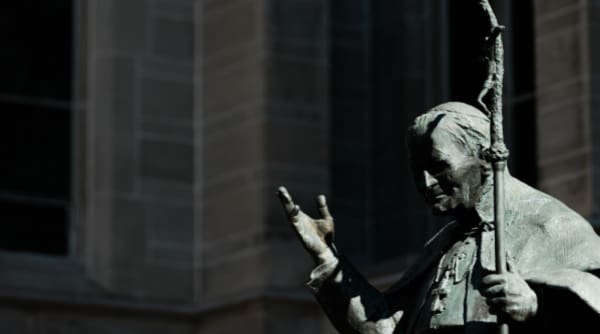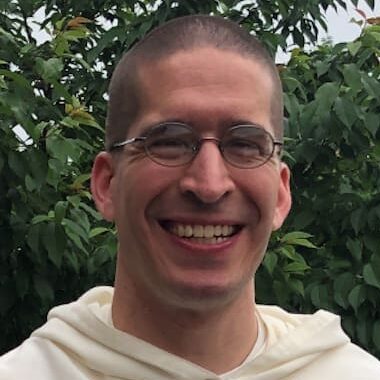For many, St. John Paul II is a model pastor for our age. So many priests of our day have looked up to him in admiration. Some have discovered their vocation, in part, thanks to his influence. Then there’s the JPII generation or JPII Catholics. And his canonization confirms this devotion to the man the crowds greeted with a “JPII, we love you!” It’s natural to wonder, How did he become such a great and beloved pastor?
Of course, many things came together to make it happen. I just want to focus on one. It’s something that gives us a window into the soul of Karol Wojtyla as he was a young man preparing for the priesthood, and it can help all of us develop a pastoral heart, the heart of the Good Shepherd.
John Paul II wrote a “Meditation on Givenness” in 1994, which was published a year after his death. In it, he recounts his state of soul as he prepared for the priesthood. He goes on at some length as he says, “I was aware that my vocation to the priesthood would put many people in my path, and that God would entrust each one of them in some special way to me: giving them to me and tasking me with them. It was then that the great need of Marian entrustment was born within me—that need which is encapsulated in the call: Totus Tuus.
“These words, first and foremost, are not so much a declaration, as a plea that I do not succumb to any desire, however subtly camouflaged. They are a prayer that I remain pure, and thus transparent to God and to men. I pray that my vision, hearing, and intellect remain pure. Totus Tuus: they all should be at the service of revealing the beauty God has given to man…Totus Tuus. All yours. Yes. We must ourselves be a total gift, a disinterested, sincere gift in order to recognize, in every man, the gift that he is, to thank the Giver for the gift of the human person” (Communio 2014, p 882).
Part of this is rather surprising. We all know how important the Totus Tuus Marian consecration was to JP II. But what’s striking here is what he identifies as the most pressing reason for him to make this total entrustment to our Lady. He wants to be sure in ministry that he truly receives others as a gift. He wants to receive those he ministers to adequately as the gift that they truly are, placed in his path by God.
Again in his words, “I was aware that my vocation to the priesthood would put many people in my path, and that God would entrust each one of them in some special way to me: giving them to me and tasking me with them. It was then that the great need of Marian entrustment was born within me—that need which is encapsulated in the call: Totus Tuus.”
So that’s some insight into the soul of Karol Wojtyla as he was preparing for the priesthood. His heart was being formed after the Good Shepherd’s own heart: to receive the people he ministered to as a gift given to him by God. And it showed in his demeanor as pastor, did it not? In his deep joy and steady enthusiasm.
The pastoral ministry was not so much an obligation to be carried out, though it is that too. It’s not so much heroic virtue in the service of others, though that too is called for. It’s not so much sacrificial altruism, though selfless sacrifice is part of it. On the deepest level, for JPII, the pastoral ministry was the receiving of “the other” as a gift, receiving the people he ministered to as a gift he was then tasked with. As he says, God “giving them to me and tasking me with them.”
And it’s not so far-fetched. I have a friend who just finished a degree and has begun teaching. In a casual email, he wrote these words to me, “I am grateful for the students. They are truly a gift. And I thank God I can feel the gift they are.” That’s nice, huh? Now, shortly after this, the same friend was telling me how much work it is. Teaching is hard work. But that doesn’t negate his earlier words about the gift.
So that’s the call of JPII’s pastoral heart: to see the students of the class you teach as a gift God has entrusted you with. To see the people of the parish you’re assigned to as a gift. To see the person knocking at your door as a gift God is giving you and tasking you with. That’s what was in the heart of JPII, a model pastor.
In the end, part of God’s overflowing goodness is the “dignity of secondary causality”: to give us a share in His work, through our ministering to others. It’s part of God’s overflowing goodness. And as our Gospel tells us, the Lord himself girds himself and ministers to us—hopefully on the Last Day but even now, every day, in the Eucharist.
Photo by Grant Whitty on Unsplash.
This post was originally published on Uppergarden.org and is reprinted here with permission.




